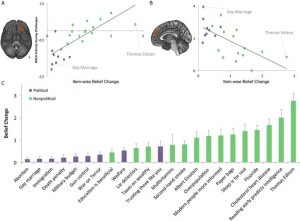Jan
10
2017
 There are several phases to a serious gaffe. First, there are the conditions which led to or allowed the gaffe to occur. Then there is the gaffe itself. There is then the response of the person or institution who committed the gaffe – which is perhaps the most important phase . Finally, there may or may not be a long term correction of the underlying conditions.
There are several phases to a serious gaffe. First, there are the conditions which led to or allowed the gaffe to occur. Then there is the gaffe itself. There is then the response of the person or institution who committed the gaffe – which is perhaps the most important phase . Finally, there may or may not be a long term correction of the underlying conditions.
Over the weekend, as I discussed yesterday, Dr. Daniel Neides, Medical Director and Chief Operating Officer of the Cleveland Clinic Wellness Institute, published an anti-vaccine screed on cleveland.com. I won’t bother debunking the anti-vaccine pseudoscience again, just read my post from yesterday. You can also read David Gorski’s excellent take down at Science-Based Medicine.
Suffice it to say the column was full of misinformation and common anti-vaccine tropes that are long debunked. The publication of a dangerous anti-science rant by Cleveland Clinic’s Director of the Wellness Center was, of course, the gaffe.
The conditions that led to that gaffe are obvious, and something about which my SBM colleagues and I have complained for years- the infiltration of alternative medicine pseudoscience into academic medical institutions. Cleveland Clinic has an “integrative medicine” center headed by Mark Hyman, who co-authored an anti-vaccine book. The Wellness Center itself embraces all sorts of vitalistic nonsense and pseudoscience.
As David says – no one should be surprised when the director of a center that embraces quackery publishes an article that embraces quackery. Continue Reading »
Jan
09
2017
This is what happens when you compromise your academic and professional integrity in order to embrace a popular fad. The Cleveland Clinic, which is historically an excellent medical institution, has the Cleveland Clinic Wellness Center, which is a center of so-called “alternative” medicine.
Such centers are a Trojan horse. They are sold to naïve academics as providing “patient centered” warm and fuzzy symptomatic treatments. Meanwhile they are really centers for pseudoscience and health fraud. They use the respected names of venerable institutions to legitimize nonsense.
The Cleveland Clinic now has to face the PR nightmare of allowing the foxes into the henhouse (actually they built a new henhouse just for the foxes).
On January 6th Dr. Daniel Neides, Medical Director and Chief Operating Officer of the Cleveland Clinic Wellness Institute, published an anti-vaccine screed on the institution’s blog. The article is full of typical anti-vaccine misinformation, and is a serious embarrassment to the Cleveland Clinic. It will also embolden the anti-vaccine movement, who can point to the article to make vaccines seem controversial and convince more confused parents not to vaccinate their children.
Continue Reading »
Jan
06
2017
 Last year 7-year-old Seth Johnson died of pancreatitis. His parents, Timothy and Sarah, are now on trial for one count of child neglect.
Last year 7-year-old Seth Johnson died of pancreatitis. His parents, Timothy and Sarah, are now on trial for one count of child neglect.
These are always heartbreaking stories, especially for a parent. Strong and conflicting emotions are stirred – on the one hand I feel anger and resentment toward the parents, who allowed their child to needlessly suffer and die. At the same time I also feel sorry for the parents. There is nothing worse than the death of a child, except feeling responsible for that death yourself. The state can add little to the emotional punishment they must be already experiencing (although they should try damn hard).
Seeing such parents as victims is not a popular position. It is much easier to see them as villains, even demons. I always strive to see reality in all its complexity, and as a result I often conclude that such parents are some combination of villain and victim. My thoughts also come with the huge caveat that I am getting all my information from the media, and do not have direct access to the medical information or the parent’s story.
Continue Reading »
Jan
05
2017
As we collectively try to climb out of the smouldering rubble that was “the truth” in 2016 (by which I mean basic intellectual integrity), many people are speculating and trying to wrap their brain around what exactly is happening. Of course, the arbitrary transition to a new calendar year changes nothing. We are still living in the same world that produced the 2016 election.
Many writers have characterized what happened as the “weaponization” of bullshit or misinformation. This is not entirely new, but it did seem to reach new heights, or to cross over some fuzzy threshold to a new level or prominence. The “weaponized” meme is also mainstream; Donna Brazile, for example, is saying that the hacked DNC e-mails were “weaponized” against them.
The two other similar memes that emerged this past year were “post truth” and “fake news.” These were added to older notions of “echochambers” or the fact that many people are living in information bubbles (whether they know it or not).
I think all of these concepts are essentially correct. We are in the midst of a misinformation war (actually many wars on many fronts). Unfortunately, it seems that the side which includes the mainstream media, the experts that provide them with information and analysis, professional journalists and academics, is losing. They are losing primarily because they have not yet adapted to the new battleground – social media. They are like the British fighting in neat rows with their visible red uniforms, while the rebels fire at them concealed behind trees and stone walls.
Continue Reading »
Jan
03
2017
 A recent neuroscientific study looked at what happens in the brains of subjects when their beliefs were challenged. The study adds a new bit of evidence to our understanding of motivated reasoning.
A recent neuroscientific study looked at what happens in the brains of subjects when their beliefs were challenged. The study adds a new bit of evidence to our understanding of motivated reasoning.
Before we get to the details of the study, let’s review what we mean by motivated reasoning. Psychological studies have shown that people treat different beliefs differently. Specifically, there is one set of beliefs that are core to a person’s identity and to which they have an emotional attachment. We treat such beliefs differently than all other beliefs.
For most beliefs people actually are quite rational at baseline. We tend to follow a Bayesian approach, meaning that we update our beliefs as new information comes to our attention. If we are told that some historical fact is different than what we remember, we will quickly change our beliefs about that historical fact. Further, the more information we have about something, the more solid our belief is, the more slowly we will change that belief. We don’t just change from one thing to the next, we incorporate the new information with our old information.
This is actually a very scientific approach. I would not easily change my belief that the sun is at the center of our solar system. It would take a profound amount of very reliable information to counter all the solid scientific information on which my current belief is based. If, however, I was told from a reliable source something about George Washington I never heard before, I would accept it much more quickly. This is reasonable, and this is how most people function day-to-day.
Continue Reading »
Jan
02
2017
 In 1918-1919 the world suffered its worst flu pandemic, with 20-40 million people dying (the CDC claims as many as 50 million). The pandemic resulted from the sudden emergence of a particularly virulent flu strain. In 2008 scientists reconstructed the exact strain, which was influenza A (H1N1).
In 1918-1919 the world suffered its worst flu pandemic, with 20-40 million people dying (the CDC claims as many as 50 million). The pandemic resulted from the sudden emergence of a particularly virulent flu strain. In 2008 scientists reconstructed the exact strain, which was influenza A (H1N1).
The virus spread rapidly throughout the world, mostly through trade routes, but the mass movement of people resulting from World War I was thought to be a key factor as well.
Recently Bill Gates stated that he does not feel the world is ready if a similar flu pandemic struck. His foundation is concerned with global health, so he pays attention to such issues. He cited the recent Ebola and Zika outbreaks as evidence that our current preparedness is inadequate.
What are the chances of another pandemic similar to 1918-19? New strains of virulent viruses emerge all the time. It seems inevitable that a particularly bad one will appear at some point, but this is impossible to predict. The CDC states that it is unlikely the next bad flu pandemic will be H1N1 because since the 1918 flu strains of H1N1 have been circulating, and therefore there is decent immunity in the population. H1N1 is also included in the annual flu vaccine. (By the way, if you did not get your vaccine yet, it’s not too late. Do it now.)
But there are many strains of flu. Bird flu is an influenza A virus that mostly infects birds, but has started to cross over to human infections. There are also other viruses, like the SARS (severe acute respiratory syndrome) virus.
Continue Reading »
 There are several phases to a serious gaffe. First, there are the conditions which led to or allowed the gaffe to occur. Then there is the gaffe itself. There is then the response of the person or institution who committed the gaffe – which is perhaps the most important phase . Finally, there may or may not be a long term correction of the underlying conditions.
There are several phases to a serious gaffe. First, there are the conditions which led to or allowed the gaffe to occur. Then there is the gaffe itself. There is then the response of the person or institution who committed the gaffe – which is perhaps the most important phase . Finally, there may or may not be a long term correction of the underlying conditions.
 Last year 7-year-old Seth Johnson died of pancreatitis. His parents, Timothy and Sarah, are now on trial for one count of child neglect.
Last year 7-year-old Seth Johnson died of pancreatitis. His parents, Timothy and Sarah, are now on trial for one count of child neglect. A recent neuroscientific study
A recent neuroscientific study  In 1918-1919 the world suffered
In 1918-1919 the world suffered 




